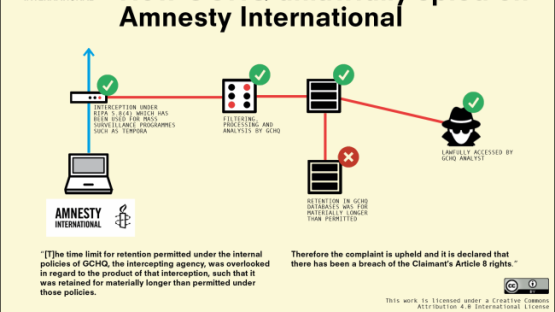GCHQ unlawfully spied on Amnesty International, Court admits

The UK’s Investigatory Powers Tribunal (IPT) today notified the ten NGO claimants in a legal challenge against GCHQ mass surveillance practices that the Tribunal had mistakenly omitted information about unlawful GCHQ actives in their judgment from ten days ago . In an email to the claimants, including Privacy International, the Court admitted that in its 22nd June 2015 judgment it wrongly failed to declare that Amnesty International had been subject to unlawful surveillance by the British government.
The Tribunal's failure is a monumental misstep in a case of significant importance to the human rights of people around the world. It is yet another display of the failure of oversight and redress mechanisms to provide genuine and rigorous public scrutiny of the British intelligence services.
Today’s revelation confirms that GCHQ acted unlawfully with respect to surveillance of Amnesty International and the South African Legal Resources Centre. Because the IPT is only required to reveal if a claimant has been the subject of surveillance if it concludes that surveillance was unlawful, the Tribunal’s judgment of “no determination” with respect to the other claimants does not mean that those organisations, including Privacy International, did not have their communications intercepted, only that the Court did not consider the intelligence agencies acted unlawfully.
Further details from the previous judgment can be found in the earlier press release.
Eric King, Deputy Director of Privacy International said:
"Our system of oversight and remedy has fundamentally failed. The communications of one of the world’s leading human rights organisations - Amnesty International - were targeted by British spies, unlawfully, and our commissioners and courts failed to realise it.Without Edward Snowden, without an eighteen month legal battle, without an honest reckoning by whichever individual spotted and admitted this grave error, the unlawful conduct of the British intelligence agencies would never have been exposed by the very court charged with exposing it.
Today's farcical developments place into sharp relief the obvious problems with secret tribunals where only one side gets to see, and challenge, the evidence. Five experienced judges inspected the secret evidence, seemingly didn't understand it, and wrote a judgment that turned out to be untrue. We need to know why and how this happened.
Any confidence that our current oversight could keep GCHQ in check has evaporated. Only radical reforms will ensure this never happens again.”